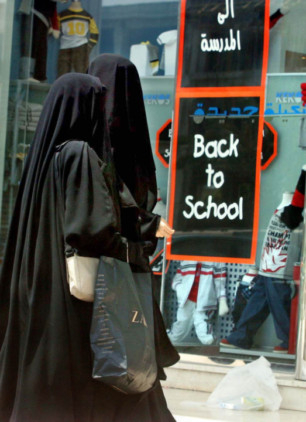
Riyadh: Saudi women are being encouraged to pursue world-class educations, with new schools opening for gifted girls and a greater emphasis on attending university.
In 1965, the country’s female literacy rate was 5 per cent. Today, 60 per cent of the college students in Saudi Arabia are women, and their employment rate has nearly tripled from 5.4 per cent to 14.4 per cent, according to a report in Thursday’s Saudi Gazette.
The king has also launched a generous scholarship programme for young Saudis to study abroad with about 130,000 students now enrolled at universities outside the country, about half of whom are in the United States. Many are women, yet they only are granted an award if a male relative travels with them.
Still, as these women return, the king may be hoping their exposure to the outside world will help him move mainstream opinion in favour of controlled change, observers say.
“I think it’s a great success story,” James B. Smith, the US ambassador to Saudi Arabia, said of the scholarships. “Nothing is more valuable than cultures coming together and sharing experiences.”
Even so, not all Saudi women necessarily want change. “For the average middle-class Saudi woman who comes from a healthy family background, life is pretty good,” Eman Al Nafjan wrote this month in an op-ed column in the International Herald Tribune.
Nafjan, who spent part of her childhood in the American Middle West, in Kansas, agrees that Saudi women suffer from a “comparative lack of rights”, but said that international coverage was forcing “painful cultural conflicts.”
Affluent and educated Saudis do not consider their family members to be oppressed, she wrote, and “many Saudis regard the requirement that their mothers, wives and sisters obtain permission slips to leave the country or pursue higher education as nothing but a minor inconvenience”.
But for some women, the limited reforms are not enough. A group of female activists last week called on women to get behind the wheel next week in defiance of a ban on women drivers, though many women say this is not their key concern.
“If you want to pick a battle, driving is the wrong one,” said Princess Ameerah Al Taweel, wife of Saudi billionaire businessman Prince Al Waleed Bin Talal and the vice chairwoman of the Alwaleed Bin Talal Foundations. “There are much more serious issues here.”
The biggest issue, she said, is that divorced women are forced to give custody of their daughters to their ex-husbands.
“What I really want is a legal identity,” said Fawziah Baker Al-Bakr, a professor of education at King Saud University in Riyadh. “Women don’t want to be kept as perpetual minors who need their husband’s signature for everything.”
Fawziah does care about driving. Her participation in a public driving protest in the early 1990s led to her losing her job and having death threats force her out of her home. She’s back at work now, but still has not met her male boss in person because women have to work in separate buildings.
Nonetheless, she remains optimistic that change in Saudi Arabia is indeed afoot. “There is a real ease in the pressure,” she said. “But the problem is that the easing is not systematic. It’s inconsistent and contradictory.”












